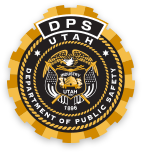UHP
By 1932, the “state road police force patrols” consisted of twenty men. Having increased in size some 400 percent in only five years, Superintendent Groo realized that supervising so many men over such a large geographic area was next to impossible. Whitney Groo totally reorganized the patrol in 1933 and 1934.
Superintendent Groo promoted L. L. Fryer from Patrolman to Captain. Patrolman B. C. Hillis was promoted to Lieutenant. Patrolmen E. R. MacDonald, Elmer Loveless, and O. H. Lund were promoted to Sergeant. Sergeant Lund was assigned to administrative duties in connection with checking stations. Superintendent Groo was assigned the rank of Colonel, but preferred to be addressed as Superintendent. This organizational change also came with a new name: “Utah Highway Patrol.”
Superintendent Groo now had more time to devote to facilitating the many needs of the Utah Highway Patrol. The Utah Highway Patrol continued to grow rapidly for the next several years. In 1934, the Patrol consisted of 30 employees. By 1936, that number had increased to 42.
Whitney Groo was truly a leader and had great vision of the future. He adopted a program which consisted of four Es. He wanted all patrolmen to have the best possible equipment. He wanted all officers to be properly trained and to educate the public to the need for safety upon the highways. He wanted the State Road Commission to engineer and build the best possible roads. Finally, he wanted strict enforcement of all laws.
In 1933, Governor Henry H. Blood, in an attempt to reduce budgets throughout state government, made the Utah Highway Patrol the regulatory arm not only of the State Road Commission, but of the State Tax Commission, the Public Utilities Commission, and the State Board of Agriculture. The State Road Commission duties required by law were to enforce traffic regulations. The duties of the State Tax Commission included collecting motor vehicle license fees and gasoline sales taxes. The Public Utilities Commission had charge of the Motor Transport Act. Finally, the State Board of Agriculture administered the Produce Dealers’ License Act, as well as various regulations covering import and export of agricultural products. With only a few patrolman and a variety of responsibilities, R. W. Groo must have certainly felt overwhelmed.
